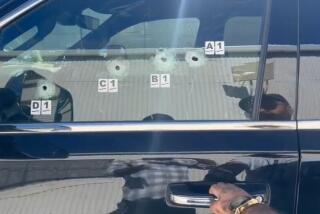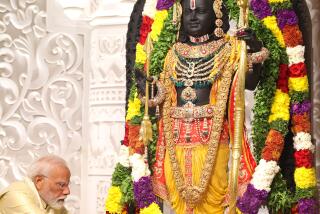Divisive ‘Unity March’ Winds Up in India : Asia: Right-wing Hindu supremacists raise a flag in Kashmir to mark the end of the 9,000-mile trek.
SRINAGAR, India — Amid constant gunfire and hollow shouts of “Victory to Mother India!” a handful of right-wing Hindu supremacists, ringed by more than 1,000 Indian combat troops, commandos and roof-top snipers, fulfilled a vow Sunday to raise the Indian flag in the heart of Kashmir’s two-year Islamic war for independence.
The flag raising culminated a 9,000-mile “unity march” that has left the Indian nation more divided than ever.
“The people of Kashmir have understood the message that the country is behind the idea of national unity and solidarity,” declared Hindu chauvinist leader Murli Manohar Joshi as he huddled in a fortified Indian air force base waiting for a helicopter to evacuate him from the war-torn state minutes after Sunday’s brief flag ceremony.
“They will understand that it is of no use to take the politics of the gun.”
But on the streets of this Himalayan state capital, a tourist mecca turned war zone where a growing majority of Kashmiris support the armed struggle for independence, there was a far different message: clear indications that this strategic border state on the extreme eastern fringe of Asia’s Islamic Belt increasingly resembles an Indian-occupied foreign land.
Moments before army escorts rushed Joshi and the few remnants of his marathon marchers into the city’s main square just after sunrise Sunday, two rebel rockets slammed into buildings nearby.
Machine-gun fire from gun battles all around the city supplied an eerie soundtrack to the carefully staged, 17-minute flag-raising ceremony. And moments after the ceremony ended, Kashmiri rebel forces, who had publicly vowed to prevent the downtown display of Hindu supremacy, opened fire on a civilian aircraft landing in Srinagar, a charter flight bringing more of Joshi’s Hindu supporters into the city.
The plane was not damaged by the rebel machine-gun and rocket fire, and police declined to give a citywide death toll for the day, which also marked India’s official day of independence from Britain.
But a stark scene on the airport road Sunday afternoon reflected the impact of the ceremony that had become a political obsession for Joshi and his Hindu-revivalist Bharatiya Janata Party.
An elderly Kashmiri man lay dead beside the road. He had been shot once between the eyes by police enforcing a shoot-at-sight curfew that has kept virtually all 4 million Kashmiris locked inside their homes day and night for more than three days.
The body, explained a paramilitary officer, had been lying in the road for more than eight hours. “It’s not our job to clear it,” he said.
Taken together, the contrasting images of Sunday’s flag raising, which Joshi had promised 45 days ago would culminate his unity march from India’s southernmost tip to its northernmost state capital, and the brutality of everyday life here and elsewhere in war-torn north India, were painful reminders of how deeply divided the nation has become in recent years.
Even before Joshi’s “pilgrimage for unity” had entered Kashmir, an advance party of his Hindu marchers was attacked Thursday by Sikh secessionists in the neighboring state of Punjab on Thursday, killing six and injuring more than 40. The Punjab attack, amid heavy Indian army security along the marchers’ route, was a clear show of force by the Sikh extremists, who have fought for 10 years to create a separate Sikh nation in the fertile state of Punjab.
To ensure the safety of Joshi’s party, the army cracked down like an occupation force throughout Kashmir that same day. Thousands of combat troops--regular army and the far less professional paramilitary troops--fanned out through Srinagar and its surrounding valley, shooting at civilians who moved without official permission.
During an impromptu funeral on Saturday afternoon for one casualty of that shooting--a 21-year-old Kashmiri laborer named Nazir Ahmed--the huge gap between the Kashmiri people and the Indian authorities became starkly visible.
“We want freedom! We want freedom!” shouted hundreds of Ahmed’s neighbors as they carried his body from his home and through an urban swamp in a traditional Kashmiri dugout canoe.
When they reached dry land, the mourners grew in number to more than 1,000, all defying the curfew that had left the streets of Srinagar a ghost town throughout the weekend. They approached the bunkers of paramilitary troops, who lowered their machine guns and ordered them to halt.
“Shoot! Shoot!” dared a young mourner who identified himself only as Rasheed. “What can they do to us. They can shoot us, only. They can kill us. But they cannot stop us.”
Marching in the spontaneous procession that ultimately drew every resident of the sprawling neighborhood was a state government official named Javed Ahmed.
“They think they can stop us by doing these things,” he said. “But they will never stop us. It is do or die. Everyone in Kashmir is now ready to die. No one is afraid. They drag our children from our homes, kill them and then just say they were terrorists.
“They are deceiving the whole world saying everyone is a terrorist here. How can everyone be a terrorist? How long can they do these bloody things and get away with it? This is supposed to be a democracy? They must have learned all this from Russia.”
A younger man marching with the growing throng was asked why the paramilitary troops shot Nazir Ahmed.
“They came into the neighborhood a few hours ago on a search-and-destroy mission,” he said, confirming the official version given later by a senior paramilitary officer. “Nazir ran, and they shot him in the back.
“The boy was moujahedeen (an Islamic holy warrior). But we are all moujahedeen in the valley now. And now, Nazir is shaheed (a martyr). So we have one more reason to fight and die.”
That was the sentiment among the mourners, which one Kashmiri journalist said would have probably swelled to more than 20,000 if there had been no curfew.
Among them were children and young women wailing and shrieking, “Oh my brother! Oh my martyr!” And, toward the front of the procession, there was a neighborhood elder, 65-year-old Jamal Dar, who explained why the young man is now considered a martyr to the Kashmiri cause.
“Whoever fights in the name of jihad (Islamic holy war), he is a martyr.”
Dar was asked if the Kashmiri secessionist uprising that began in January, 1990, is, indeed, a jihad.
“Yes,” he replied. “We are not trying to settle any scores with anybody. We simply want freedom from India. We want to be away from these Indian dogs.”
“Don’t call them dogs,” another mourner shouted, interrupting the neighborhood elder. “It is an insult to dogs. We have nothing against dogs. Only Indians.”
Against this backdrop, Joshi and a few dozen of his supporters were flown into Srinagar late Saturday, after Indian military authorities stopped their procession of vehicles more than 100 miles south of Srinagar under the pretense that the mountainous road was blocked by avalanches. In reality, the road was clear, but authorities feared that Joshi’s procession would be set upon by militants, further embarrassing the government and its security forces.
Despite his brief stay in a city where not a single civilian was permitted on the streets, let alone within earshot of the Bharatiya Janata Party president, Joshi later proclaimed at a news conference that the majority of Kashmiris “are not militants.”
When asked how many Kashmiris support him, Joshi said, “Very many--the silent majority.”
However, Joshi’s assertion was undermined not only by India’s intellectuals, its mainstream press and the Kashmiris themselves, but even by institutions that are seen to support the policies of his party, which is India’s main opposition party and potential heir to power in the nation’s next general elections.
“Rather than rallying the people of Kashmir to the Indian tricolor (flag), the B.J.P.’s action has given a fresh lease on life to what was, in the last two months, a simmering conflict between the militants and the Indian union,” the nation’s largely pro-B.J.P. daily newspaper, The Hindu, declared in an editorial entitled, “Stop the March.”
As if to confirm such criticism, the state’s half-dozen largest armed rebel factions scored the biggest hit of their guerrilla war two days before Joshi’s arrival--a time bomb that exploded in the desk drawer of Kashmir’s top police official while all of the state’s top security officials were meeting in his office to prepare for Joshi’s arrival.
The officials survived the explosion, but all were badly injured, damaging not only the state’s security apparatus but its morale as well.
“Broadly speaking, yes,” said C. S. Dwivedi, director general of India’s national paramilitary force, the Central Reserve Police Force, when he was asked if the bombing had hurt the morale of all security forces in the state.
Later, as Joshi and his supporters rushed to hoist their flag amid chaos and jostling for position in front of news photographers permitted to cover the stage-managed event, Gautham was asked if a ceremony that had cost so many lives and prompted the deployment of so many troops was worth it.
“These are all just political stunts,” he said. “We can say nothing about them. The army cannot involve itself in these political matters.”
But, in the Hindu-dominated southern Kashmiri city of Jammu, where Joshi addressed a public rally after leaving Srinagar on Sunday morning, the B.J.P. president declared a major victory, proclaiming that his is “the only party that has the vision, strength and dedication to launch marches for good causes.”
At the same rally, another party leader, Atal Bihari Vajpayee, added: “The Indian flag was hoisted today on the chest of the terrorists. This was a warning to all others that India will not part with Kashmir at any cost.”
More to Read
Sign up for Essential California
The most important California stories and recommendations in your inbox every morning.
You may occasionally receive promotional content from the Los Angeles Times.










